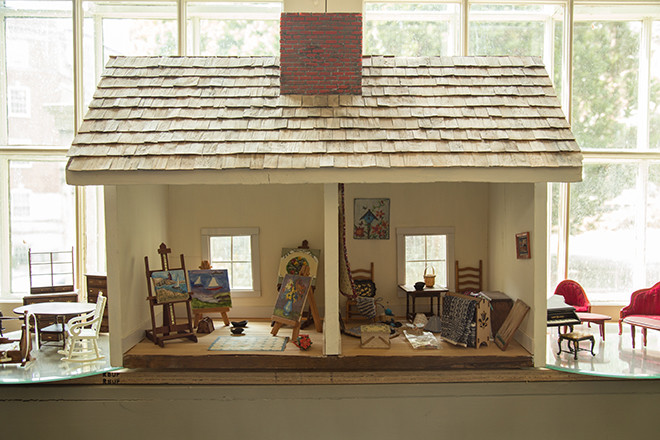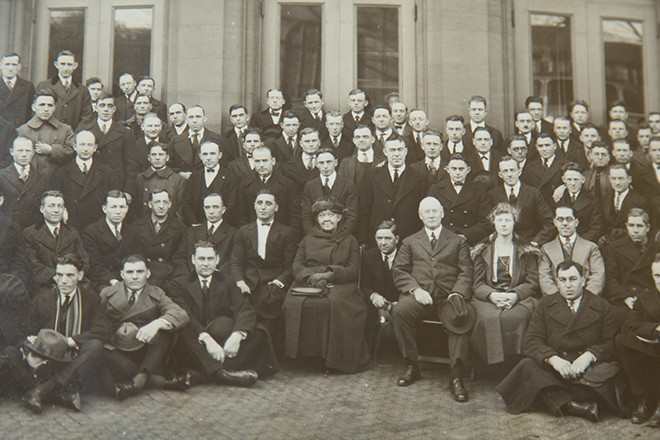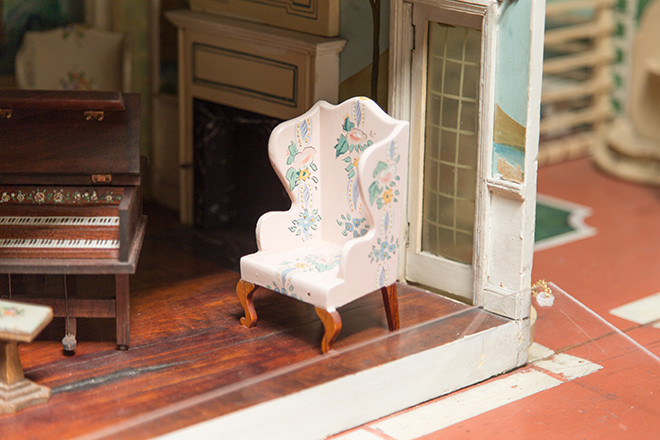The Handicraft Club was founded in 1904 by Julia Lippitt Mauran, Mary Parsons and eight other women who shared a vision of “Craft and Congeniality,” according to club records. In the early years of the club’s existence, classes in crafts such as bookbinding, silver and metal work, woodcarving, enameling, pottery, basketry, jewelry making, weaving and photography were held in rented rooms around the East Side. At the time, the influence of the American Arts and Crafts movement was strong in Providence. By 1925 the Handicraft Club had 250 members and the financial wherewithal to purchase the Truman Beckwith House on College Hill. In 1964 the club started an endowment fund to meet the challenge of preserving the property, which is on the National Register of Historic Places (NRHP).
Today, the club has over 400 members and classes continue to be offered in arts and crafts that are of contemporary interest – decorative painting, photography, basket making, weaving, knitting and paper cutting, as well as oil, water color, acrylic and portraiture painting, to name just a few. But lately they’ve been really into dollhouses.
Izzy Goff, long-time club member and past president explains. “It all started when Alice Beckwith, the club’s historian, gave a report to the board of directors about the history of the Tynietoy Company and its connection to the Handicraft Club.”
The Tynietoy Company was founded in 1920, and incorporated in 1921, by Handicraft members Marion Perkins and Amey Vernon. Perkins, a RISD graduate, was a renowned furniture designer. Perkins often made miniature samples of her pieces to show to customers. Other members “loved the miniatures” and thus was born the idea for the company. Tynietoy operated out of the Truman Beckwith House for a number of years before moving to a larger space on Eddy Street in Providence.

Tynietoy made dollhouses and miniature furnishings for them from the 1920s into the 1940s. The dollhouses were sold in stores such as Marshall Field’s in Chicago and FAO Schwarz in New York, through catalogues and by special order. When Beckwith’s report revealed that this very successful company was founded by two Handicraft Club members, Goff says that “there was complete enthusiasm on the part of the board for the club to acquire a dollhouse.”
In a bit of serendipity, just as club members were beginning their search in 2013, Susan Grimshaw, a noted collector and expert on the Tynietoy Company, had advertised one of its most elegant models: a ten-room “Colonial Mansion,” for sale on eBay. When she learned of the Handicraft Club’s interest, Grimshaw immediately took her dollhouse off the site and dealt directly with the Handicraft Club. She felt the dollhouse would be “going back home” to the Handicraft Club and to the Truman Beckwith House.
Tynietoy dollhouses were no ordinary dollhouses. According to Grimshaw, in the fall of 1920 the company’s “Nantucket Cottage” was featured in Ladies’ Home Journal. Its most expensive model sold for $200 in the early years. By the mid-1930s the cost had risen to $250 – approximately $4,000 in today’s currency. Collectors covet all things Tynietoy, she says, and the dollhouses regularly sell at auction for $8,000-$15,000. A particularly desirable “Colonial Mansion” model (the same model the Handicraft Club acquired) sold in 2004 for $30,000.
Tynietoy furnishings are also highly collectible. When PBS’s Antiques Roadshow came to Providence in 2005, Andy Ourant, the show’s toy, doll and teddy bear appraiser, immediately recognized miniature furniture brought in as authentic Tynietoy.
 At one point Tynietoy employed about 40 people, including, Beckwith believes, World War I veterans who were participating in a rehabilitation program at RISD. Beckwith came across a threefoot long panorama-type photograph in RISD’s archives showing about 100 program participants – all men – some of whom, she believes, were employed by Tynietoy. “Right in the middle of the photo is Mrs. Radeke, President of RISD at the time,” says Beckwith. Radeke, she points out, was also a member of the Handicraft Club.
At one point Tynietoy employed about 40 people, including, Beckwith believes, World War I veterans who were participating in a rehabilitation program at RISD. Beckwith came across a threefoot long panorama-type photograph in RISD’s archives showing about 100 program participants – all men – some of whom, she believes, were employed by Tynietoy. “Right in the middle of the photo is Mrs. Radeke, President of RISD at the time,” says Beckwith. Radeke, she points out, was also a member of the Handicraft Club.
The club has established a fund to buy Tynietoy furnishings for the Colonial Mansion. Margaret Lederer, co-chair of the committee, is excited about the project. “What appeals to me is the aspect of women’s history and women in business it brings forward. The two founders had the courage to step outside the more common and accepted roles of women of their social status at the time.” The founders incorporated the ideals of the Arts & Crafts movement into their endeavor. They reached out to RISD and to Sydney Burleigh to help with the furniture and house designs. Burleigh drew on the resources of the American Furniture collection in the RISD museum at the time. “So, for example,” explains Lederer, “the (miniature) chairs were painted with historically accurate textile patterns.”

The club looks at the purchase of the dollhouse as much more than an historical acquisition. “The founders of Tynietoy created this miniature world,” says Beckwith. “A crossroads of useful crafts.” It is hoped that the Colonial Mansion acquisition will create similar crossroads. Already, members have been inspired to create their own miniatures (the club has purchased a second dollhouse – just a regular old dollhouse – for this purpose) and so rug hookers and weavers, fine art and decorative art painters, have begun interacting with each other outside their own areas of interest. The club hopes to eventually create a generational crossroads as well, by offering mini-classes for members to work with a grandchild, or younger friend, to complete a miniature project; or to spark interest in arts and crafts by working with, say, the Athenaeum’s Children’s Program or the Girl Scouts.
“The project,” sums up Lederer, “is a celebration of women’s history, craft and community.”
To see the dollhouse in person, contact the club to arrange a tour. Or, stop by the Truman Beckwith House at 42 College Street during its annual public exhibition of members’ work – May 19 and 20, between 9am and 4pm. Anyone with Tynietoy miniatures rattling around their attic is encouraged to consider donating or selling them to the Handicraft Club.
Comments
No comments on this item Please log in to comment by clicking here